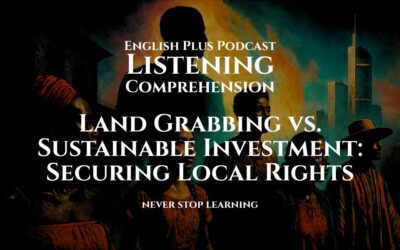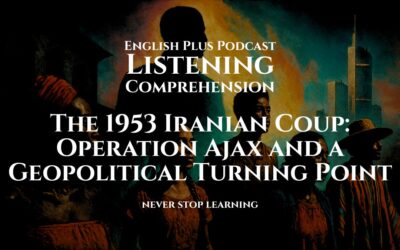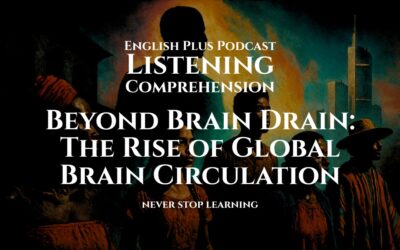Listen | Public Speaking Tips
Click to read the transcript of the lecture, but don’t do it before you listen if you want to improve your listening skills.
Let’s talk about something that almost everyone fears but everyone faces at some point—public speaking. Whether you’re presenting in front of a class, speaking at a meeting, or giving a toast at a wedding, public speaking can feel like one of the most nerve-wracking things we do. But here’s the good news: like any skill, it can be learned and improved with practice and a few key techniques.
First, let’s tackle the biggest obstacle to public speaking: fear. You’ve probably heard the saying that people fear public speaking more than death—whether that’s true or not, it’s clear that standing in front of an audience can trigger some serious anxiety. Why does this happen? Well, a lot of it comes from the fear of being judged. We worry about what people will think, how we’ll sound, and whether we’ll remember what we’re supposed to say. The truth is, though, most of the time, the audience isn’t judging us as harshly as we think. They want us to do well. They’re rooting for us! So, the first tip is to shift your perspective: instead of thinking about how people might criticize you, focus on how your message can help them. It’s all about turning nervous energy into positive energy.
Another thing that really helps with nerves is preparation. There’s no way around it—if you know your material inside and out, you’re going to feel a lot more confident when you step up to speak. But preparation doesn’t just mean memorizing your speech word for word. In fact, trying to memorize everything can make you more anxious if you forget a line. Instead, aim to really understand your main points. Think of your speech as a conversation rather than a performance. You don’t have to say everything perfectly. As long as you know the key ideas you want to get across, you’ll be able to adapt and stay on track.
Now, let’s talk about delivery. A big part of public speaking is how you deliver your message, not just what you say. Your voice is one of your most powerful tools. Varying your tone, pace, and volume keeps your audience engaged. Imagine listening to someone who speaks in a monotone voice the entire time—boring, right? On the other hand, someone who emphasizes key points, pauses for effect, and uses different tones to express excitement or seriousness is much more likely to keep your attention.
And then there’s body language. You can say a lot without even speaking. Standing tall, making eye contact, and using gestures to emphasize points all help you come across as confident, even if you’re feeling nervous inside. Have you ever noticed that when people are nervous, they tend to fidget? Maybe they play with their hair, or they shuffle their feet, or they keep looking down. The key is to be aware of these habits and practice more purposeful movement. Don’t overthink it—just try to appear open and engaged. It helps to record yourself practicing so you can spot any habits you want to adjust.
Another thing to remember is that public speaking is about connection. It’s not about you delivering information and the audience just passively receiving it. It’s a two-way street. Ask questions. Make eye contact. Gauge how the audience is reacting and adjust your delivery if you need to. If they look confused, slow down and explain more clearly. If they’re nodding along, you know you’re on the right track. You’re there to serve the audience, so staying attuned to their reactions can help you deliver a better, more engaging talk.
Finally, don’t forget that public speaking is a skill you build over time. Even the best speakers didn’t start off being amazing. It takes practice, and it’s okay to make mistakes along the way. In fact, those mistakes are valuable because they teach you what works and what doesn’t. So, the next time you have to speak in public, see it as a learning experience. The more you do it, the more comfortable and confident you’ll become.
So, to sum it up: focus on your audience rather than yourself, prepare thoroughly but don’t worry about perfection, use your voice and body language to your advantage, and practice, practice, practice. Before you know it, you’ll be handling public speaking like a pro.
Comprehension Quiz
Expand Your Vocabulary
- Nerve-wracking
Nerve-wracking means something that causes a lot of anxiety or stress. Public speaking is often described as nerve-wracking because it makes many people feel anxious. In everyday English, you might say, “The job interview was nerve-wracking because I really wanted the position.” - Judgment
Judgment refers to the opinions or evaluations people form about something or someone. In the context of public speaking, the fear of being judged by the audience is a common cause of anxiety. You might say, “I’m nervous about singing in front of others because I’m worried about their judgment.” - Perspective
Perspective is a way of thinking about or viewing something. The lecture suggests shifting your perspective to focus on helping the audience, rather than worrying about being judged. In daily conversation, you could say, “From my perspective, it’s important to take breaks during work to stay productive.” - Preparation
Preparation means the action of getting ready for something. In the lecture, preparation is highlighted as a key factor in feeling confident when speaking in public. For example, you might say, “Good preparation before an exam can reduce your stress.” - Monotone
Monotone refers to speaking in a single, unvaried pitch or tone, which can make a speech sound dull. The lecture advises varying your tone to avoid speaking in a monotone voice. In everyday English, you could say, “His voice was so monotone that I found it hard to stay focused during the presentation.” - Body language
Body language refers to the nonverbal signals we send through our posture, gestures, and movements. The lecture emphasizes the importance of body language in projecting confidence during public speaking. In a casual conversation, you might say, “Her body language showed that she wasn’t interested in the conversation.” - Engage
Engage means to involve or attract someone’s attention. In the context of public speaking, engaging the audience means connecting with them through eye contact, questions, or interaction. In daily use, you could say, “The teacher did a great job engaging the students by asking thought-provoking questions.” - Gauge
Gauge means to estimate or assess something. The lecture suggests gauging the audience’s reactions to adjust your delivery if necessary. You might hear someone say, “It’s hard to gauge how people feel about the new policy without getting their feedback.” - Fidget
Fidget means to make small movements, often when you’re nervous or impatient. The lecture mentions that nervous speakers often fidget and suggests becoming aware of this habit. In everyday English, you could say, “He started to fidget in his chair when the meeting went longer than expected.” - Adapt
Adapt means to adjust to new conditions or situations. In public speaking, adapting means being flexible and changing your delivery based on the audience’s reactions. You might say, “When the power went out, the presenter had to adapt by giving his speech without slides.”
Vocabulary Quiz
Let’s Talk
- Public speaking can be a nerve-wracking experience for many people. What do you think makes public speaking so intimidating, and how can someone overcome that fear?
- The lecture suggests focusing on helping the audience rather than worrying about judgment. How might this shift in perspective change the way you approach public speaking or other challenging situations in life?
- Preparation is key to delivering a good speech. What are some ways you can prepare for public speaking that would also reduce your anxiety or improve your confidence?
- Body language plays an important role in how we are perceived by others. How conscious are you of your own body language when you’re speaking to others, and what changes could you make to improve it?
- The lecture mentions the importance of engaging the audience. In your opinion, what are some effective ways to keep an audience engaged during a presentation or speech?
- Mistakes in public speaking are common and can be valuable learning experiences. Have you ever made a mistake while speaking in public, and how did you handle it? What did you learn from the experience?
- Public speaking isn’t just about delivering information—it’s about connection. How do you think developing strong public speaking skills could benefit you in everyday life, even outside of formal presentations?
These questions are designed to get you thinking more deeply about the challenges and opportunities that come with public speaking. Feel free to share your thoughts in the comments or discuss them with friends and family!










0 Comments